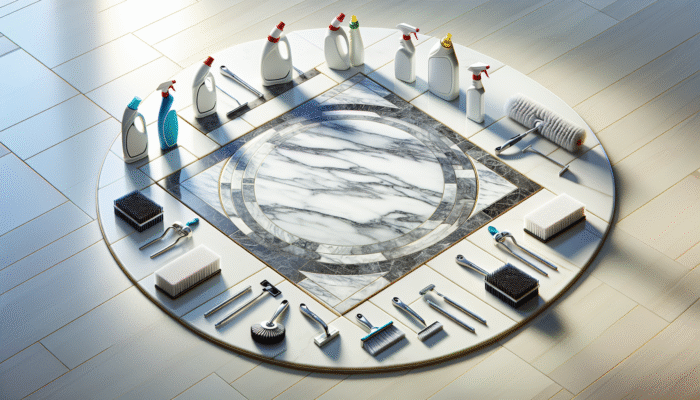
Marble floors exude an undeniable luxury that can enhance the aesthetic of any room, yet they require diligent maintenance to preserve their stunning visual appeal. This exquisite investment calls for regular upkeep that remains within budget. To keep your home’s magnificent focal point captivating, exploring practical, wallet-friendly methods to maintain its luster is essential. By following these strategies, you can ensure that your marble floors continue to impress without straining your finances.
As you embark on your marble care journey, you’ll find that uncomplicated, routine practices can greatly protect your investment. Committing to regular dust mopping prevents scratches, making your own cleaning solutions from readily available ingredients helps you avoid harsh chemicals, and dealing with stains through targeted techniques guarantees the preservation of the stone’s integrity. Embracing these methods allows you to maintain the elegance of your marble floors with remarkable ease and effectiveness.

Furthermore, using protective mats proves to be a transformative approach for maintaining the beauty of your marble, and you may be surprised to discover that a common kitchen ingredient can serve as an effective polishing agent. Let’s delve into how these straightforward measures can ensure that your marble floors remain the envy of your neighbourhood, highlighting how a little knowledge can save you from the expense of hiring professional cleaning services.
Establish a Consistent Dust Mopping Routine to Preserve the Beauty of Your Marble Floors
Implementing a consistent routine of regular dust mopping is crucial for maintaining the pristine appearance of your marble flooring while effectively preventing scratches caused by everyday dirt and debris. It’s advisable to utilise a soft, non-abrasive duster that glides gently across the surface. Avoid using a vacuum cleaner unless it is specifically equipped with a setting for hard floors; otherwise, the risk of dragging coarse particles across your marble could lead to irreversible damage.
Make it a habit to perform this task daily, or even several times a day in areas experiencing high foot traffic—this practice is fundamental to preserving the flawless shine you desire. Remember, should you encounter any spills, act swiftly; cleaning them up immediately is essential to prevent stains from embedding themselves in the porous nature of your marble surface. With dedicated care and attention, you will ensure that your marble floors remain timeless and elegant for many years to come.
Create Effective Homemade Cleaning Solutions to Maintain Your Marble Floors
For a gentle yet effective homemade cleaner, combine a few drops of mild dish soap with warm water, then apply this mixture to your marble floors using a soft cloth. This uncomplicated solution effectively lifts dirt without compromising the delicate surface of the marble. After cleaning, it is vital to rinse the floor with clean water to eliminate any soap residue, and promptly dry the area with a soft towel to avoid unsightly water spots that could detract from your marble’s appearance.
In cases of stubborn stains, prepare a paste using baking soda and water. Apply this paste directly onto the stain, cover it with plastic wrap, and allow it to sit overnight. The following day, gently wipe away the paste and rinse thoroughly to restore your floor’s pristine look. Always steer clear of acidic cleaners, such as vinegar, which can etch and damage marble surfaces. Regular use of your DIY solution will significantly aid in keeping your marble floors looking immaculate and inviting.
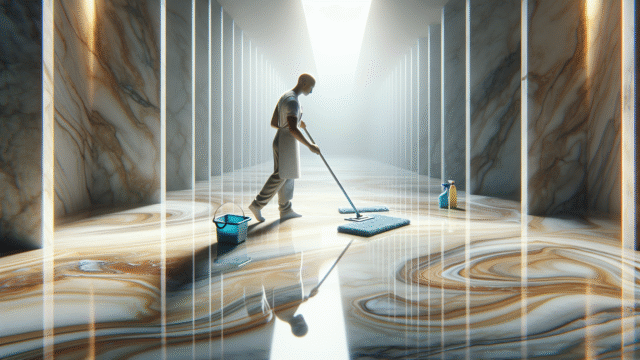
Implement Effective Strategies for Managing Spot Stains on Your Marble Surfaces
While your DIY cleaning solutions are excellent for overall upkeep, addressing specific spot stains on marble necessitates a more concentrated approach. It is imperative to act swiftly; marble is a porous material and can absorb stains alarmingly fast. For organic stains, such as those from coffee or wine, create a paste of baking soda and water, apply it directly to the stain, cover it with plastic wrap, and allow it to rest for 24 hours before rinsing it away.
If you come across oil-based stains, substitute cornstarch for baking soda in your paste. Exercise caution during both the application and removal processes—scrubbing too vigorously can damage the marble’s surface. Always ensure that you dry the area thoroughly after treatment to prevent any water spots from forming, which can dull the marble’s shine and allure.
Incorporate Protective Mats and Rugs for Enhanced Care of Your Marble Floors
To effectively shield your marble floors from scratches and spills, placing protective mats and rugs in high-traffic areas is a prudent decision. These protective barriers serve as a shield, absorbing daily wear and tear that could otherwise mar your elegant surfaces. When selecting mats, opt for those designed with a non-slip backing to prevent slips and ensure that they remain securely in place, enhancing safety within your home.
When choosing rugs, it’s essential to select ones that do not retain moisture, as dampness can adversely affect the marble beneath. Regular cleaning of these mats and rugs is critical to prevent the transfer of dirt onto the marble, which could lead to scratches and a dull finish. Additionally, remember to occasionally lift the mats and thoroughly clean the flooring underneath to maintain its lustrous appearance and prolong the life of your marble floors.
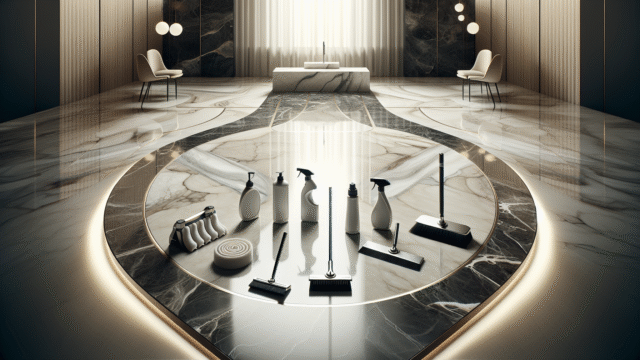
Revitalise the Shine of Your Marble Floors by Polishing with Baking Soda
You can effortlessly restore the shine of your marble floor using a simple baking soda polish. All that is required is a bit of water and some baking soda. Begin by mixing three tablespoons of baking soda with enough water to create a paste, ensuring it achieves a thick consistency rather than being too runny, which could affect its efficacy.
Next, apply the paste to your marble floor, paying special attention to dull or stained areas. Use a soft cloth to gently rub the paste into the surface in a circular motion. Avoid scrubbing too vigorously; allow the baking soda to work its magic. Once you have treated the area, rinse it off with clean water and dry the floor with a soft towel. You will likely observe an immediate improvement as the natural shine returns, giving your marble a refreshed and vibrant look.
Common Queries About Marble Floor Maintenance Addressed
Discover Effective Methods to Repair Small Scratches or Chips in Your Marble Flooring Without Professional Assistance
It is indeed feasible to address small scratches or chips in your marble flooring by gently sanding the affected area with fine-grit sandpaper. This method enables you to smooth out the surface without causing further damage or compromising the integrity of the marble.
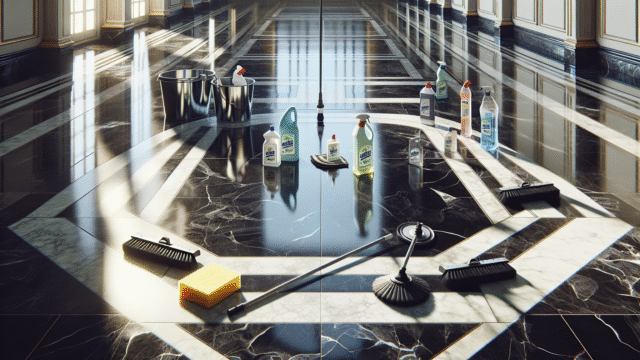
After sanding, you can apply a matching marble polish to restore the shine and ensure a seamless finish that complements the rest of your flooring.
Explore Strategies to Prevent Marble Flooring From Dulling Over Time in High Traffic Areas
To prevent dullness in high-traffic zones, it is advisable to use rugs to minimise wear. Regularly dusting your marble floors is also vital in preserving their appearance. Moreover, promptly cleaning up spills is crucial to avert stains and etching, which can compromise the floor’s aesthetic and longevity.
Find Out Whether Using a Steam Mop on Marble Floors Will Lead to Damage
Utilising a steam mop on marble floors is not advisable, as it can potentially inflict damage. The heat and moisture associated with steam mopping may deteriorate the stone, leading to discolouration or cracking over time. It is best to adhere to gentle cleaning methods that are safe and effective for your marble.
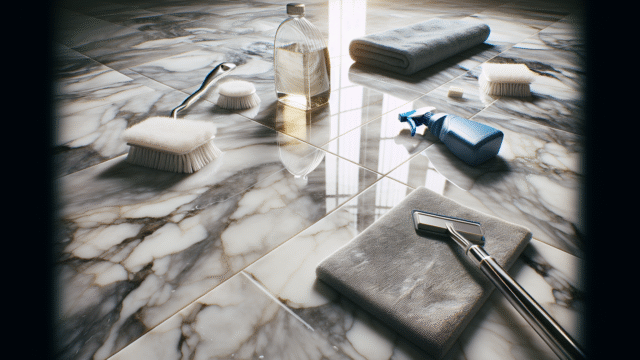
Learn Effective Techniques to Deal with Acidic Spillages Like Lemon Juice or Vinegar That Have Etched the Marble Surface
In the event of acidic spills, it is necessary to gently buff out the etch marks using a suitable marble polishing powder. After buffing, rinse the area thoroughly and dry it with a soft cloth to restore the shine of your marble following any acidic spillage, ensuring that your floors maintain their luxurious appearance.
Understand Environmental Conditions That Are Crucial for Preserving Your Marble Floors
To successfully preserve your marble floors, it is essential to consider two pivotal factors: indoor humidity levels and temperature control. First, maintaining indoor humidity levels between 30-50% is crucial; high humidity can cause marble to absorb moisture, resulting in discolouration, staining, and even cracking. Conversely, low humidity may cause the marble to become dry and brittle, which increases the risk of chipping or cracking over time.
Secondly, ensuring a consistent temperature is of utmost importance. Ideally, the temperature should be maintained between 60-80°F. Extreme fluctuations in temperature can cause the marble to expand and contract, leading to cracks or fissures. It is vital to avoid exposing your marble floors to excessive heat or cold, such as placing hot pans directly onto the surface or using harsh cleaning chemicals that could compromise the stone’s integrity.
Practical Tips and Tricks for Maintaining the Brilliance of Your Marble Floors
Preserving the brilliance of your marble floors does not have to entail hefty expenses. Regular dust mopping is essential to prevent scratches, and crafting your own cleaning solutions provides a gentle yet effective means of upkeep. Promptly addressing stains is crucial to ensure they do not set into your marble, which could lead to more extensive damage.
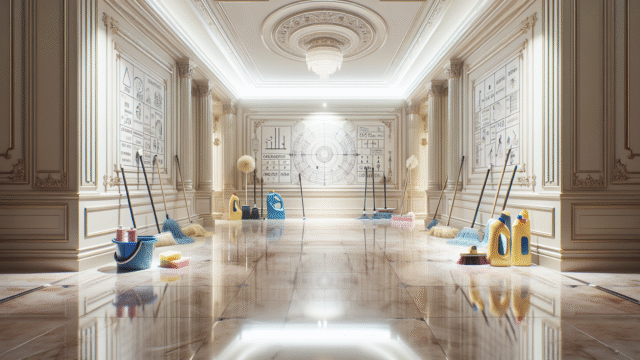
Utilising mats and rugs will effectively protect high-traffic areas, and polishing with baking soda can restore a homemade sparkle to your floors. By following these straightforward, budget-friendly tips, you will successfully maintain your marble’s luxurious appearance for many years to come, ensuring that your home continues to impress with its elegance.
The Article Marble Floor Maintenance: 5 Affordable Tips to Consider appeared first on https://fabritec.org
The Article Marble Floor Maintenance Tips: 5 Cost-Effective Strategies Was Found On https://limitsofstrategy.com
